Quarteira Decides winner
Citizens of three neighbourhoods in the city of Quarteira will be able to decide and implement the projects they consider most relevant, within the framework of Participatory Budgeting processes.
Creators
Who is behind this?
Who is joining forces?
Municipality of Loulé
http://www.cm-loule.pt
Portugal
Quarteira Parish Council
https://www.jf-quarteira.pt
Portugal
The partners are 2 local authorities with complementary competences in the territory. Other partners might be mobilized during the project according to the priorities and needs of participants.
Idea
Idea pitch
3 neighbourhoods characterized by ethnic diversity, stigmatization, social conflicts, political polarization and distance from centres of power, will decide and implement the projects they consider most important to the community, through a Participatory Budgeting (PB) methodology.
Each neighbourhood will have its own budget that will be discussed till a consensus is reached among the residents. To facilitate this process, local tutors will be selected and trained in each neighbourhood
Where will your project idea take place?
The project will take place in the neighbourhoods of Checul, Abelheira and Asa Branca - Quarteira
What is the specific societal challenge faced by this region?
Quarteira is located in the Algarve region in the south of Portugal. It is a territory marked by the tourism industry, which attracts low-skilled labour, in search of precarious, low-paid and seasonal employment. This labour force comes from many countries, which are looking for better living conditions here. The three neighbourhoods indicated are formed by residents mostly from former Portuguese colonies and Eastern European countries, with no feeling of belonging to this territory and with distinct ethnic and cultural identities. These characteristics turn those neighbourhoods into places of low civic cohesion, with regular social conflicts, no community spirit or significant opportunities for civic and political participation, far from the centres of power and decision-making.
Who are you doing it for?
This project has three main target groups:
i) the residents of the three neighbourhoods, who will have the power to collectively define their problems, decide and implement the most important project to improve community life. The methodology to be used allows the integration of all opinions, develop a spirit of dialogue and collaboration, as well as understanding differences and building consensus in an environment marked by social conflicts;
ii) the young neighbourhood tutors, who will be trained to take ownership of the methodology, ensuring the protagonism of the youngest and the transfer of methodological skills to the community itself;
iii) the partners, so that they know the method, can see it in practice, learn from it and replicate it in other similar territories.
How do you plan to get there?
A PB process will be organized in each neighbourhood. This foresees: i) allocation of a budget amount to each neighbourhood based on the requested funding; ii) reinforcement of this amount with budget contributions from partners; iii) participation sessions with the residents of each neighbourhood to discuss common problems, define projects to improve community life and decide on the most important project; iv) these projects will be implemented by the residents with the budget allocated to each territory and with the support of the team and the entities of the partnership; v) in each neighbourhood two young tutors (one man and one woman) will be selected and trained to join the team, co-ordinate the participation process and facilitate the relationship with the community.
What are the expected results?
We expect:
- to build more socially cohesive and civic communities that are able to understand and value their internal differences, build spaces for dialogue, and strengthen their capacity for collective action. We want these communities to practice and be inspired by high-intensity democratic participation dynamics;
- create three projects, one in each neighborhood, fully decided and implemented by the residents;
- train young tutors to master and implement active democratic participation methodologies, thus becoming agents of change in their own territories;
- to produce a participatory budgeting methodology guide adapted to these territorial contexts, facilitating its replication elsewhere in Portugal and Europe.
How does your idea strengthen active citizenship at a local and community level?
The project foresees the organization of a PB process in each neighbourhood. This methodology foresees and requires: i) creation of spaces for dialogue among residents; ii) listening of their ideas and positions on the problems and needs of the neighbourhood; iii) orientation of the process towards active listening and consensus building among the participants, so that they understand the differences and are able to collectively define priorities to improve life in their territory; iv) that the decision on priority projects in each neighbourhood and their implementation be ensured by the residents themselves, thus exercising the power to decide and act together. For all these reasons, the project represents the materialization of the exercise of participatory democracy at community level.
Why is this idea important to you?
This idea is important to us for different reasons:
- We recognise that there is a retrocession in democratic regimes, a loss of confidence in institutions and civic deserts in countries like ours;
- we believe in democracy and the strength of citizen participation as a way to transform society and build more vibrant and cohesive communities;
- this project is fully part of the mission of our Association, which has elected the promotion of participatory democracy as one of its two main pillars of work;
- this initiative will allow us to prove the success of these methodologies to reactivate amorphous societies, build collective action and give a renewed sense to democracy.
€ 50,-
Total budget
€ 50,-
Funding requested from Civic Europe
Major expenses
Personnel costs (includes tutors) 35,000.00 €
Participatory Budgeting projects 6,000.00 €
Activities 6,000.00 €
Methodological guide 1,500.00 €
Communication 1,500.00 €
What do you need from the Civic Europe community?
Our team would like to receive constructive input on the project and how it can be improved and benefit from other experiences and interventions. Independent and exempt opinions are always an excellent way to learn.
Project Journey
Today we are in the spotlight
The Quarteira Decides project deserves national recognition in today's edition of Público, Portugal's leading newspaper.
All the information at the following address
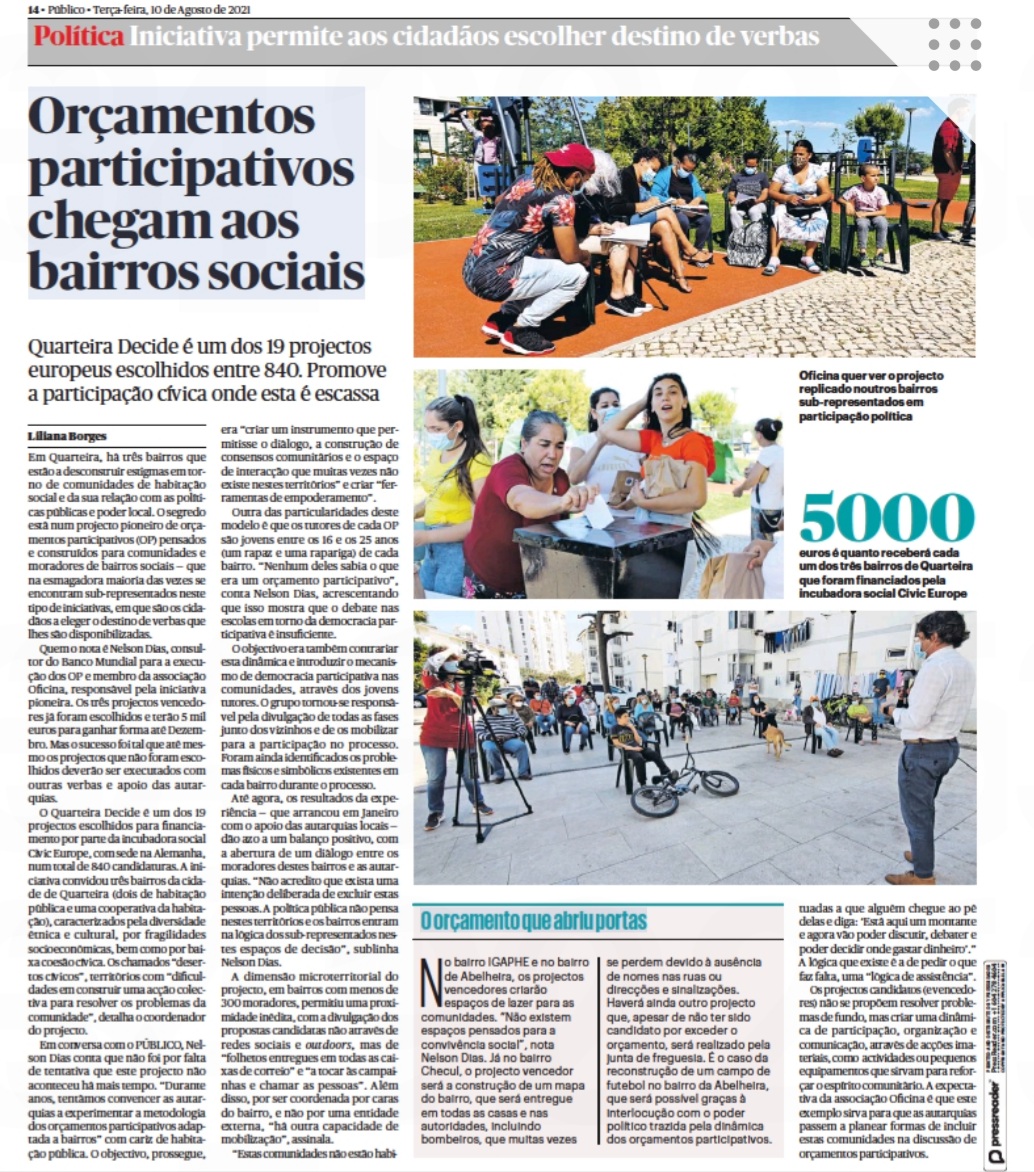
QUARTEIRA NEIGHBOURHOODS VOTE ON PARTICIPATORY BUDGETING
The residents of the IGAPHE, Checul, Abelheira and Amendoeira neighbourhoods, in the city of Quarteira, voted last Saturday to decide on the projects to be implemented within their respective Participatory Budgeting processes. After the information sessions, held in April, the meetings for the presentation of proposals, which took place in May, and the technical feasibility analysis of the ideas received, concluded at the end of June, it was time for these communities to decide where to apply the five thousand euros allocated to each territory. At the IGAPHE five projects were on the ballot, namely: the creation of leisure areas, one to the south and another to the north of the neighbourhood; the installation of bicycle parking stations; the delimitation of car parking spaces, and the organisation of a health fair. The winning investment is the installation of a leisure area for families, in the southern part of the development. In Checul the following three proposals were put to the vote: the implementation of a family leisure area; the installation of machines to perform physical exercise in the open air; and the creation of a map of the neighbourhood, which received the most votes. This is a very simple idea, which aims to respond to a need widely felt by the population, particularly when they request a visit from the security forces or civil protection to the location and they cannot locate the streets and door numbers. This project does not exhaust the amount allocated to the neighbourhood, so the team will analyse with the proponents the feasibility of partially implementing the second most voted investment. In Abelheira and Amendoeira four projects were put to the vote: the installation of a dressmaking room; the development of a training course for young people; the creation of a leisure area divided between the two neighbourhoods and the implementation of a leisure area common to both territories, the latter having received the most votes. The voting process in these neighbourhoods was coordinated by a team of young tutors of the Participatory Budgeting process, residents of these areas, who, since March, have been promoting the whole process among the population. The winning projects will now be implemented, and a working group will be set up in each territory, made up of the project team, tutors and proposers, to make operational decisions.
More photos available at Notícias - OFICINA
ABELHEIRA AND AMENDOEIRA DECIDED TO PARTICIPATE
The Quarteira Decides Project promoted an information session in the Abelheira and Amendoeira neighborhoods, with the purpose of making the Participatory Budget (PB) process known and clarifying the doubts of the participants. Nelson Dias, from the Oficina Association and coordinator of the project, told the 45 people present that they should not see the PB as a space to ask for or demand investments or services for these neighborhoods, but rather as an opportunity to propose and decide on the common project that they will be able to do with the 5 thousand euros. Erica Silva and Miguel Dias, representing the team of tutors, added that this is an opportunity to do something for our neighborhoods and therefore we should think together the proposals we want to present.
For more info
The money has arrived
Each of our neighbourhoods will have 5,000 euros to apply to projects proposed and decided by the community. We have therefore decided to print notes to distribute in each neighbourhood. We hope we will not be prosecuted by the European institutions :)
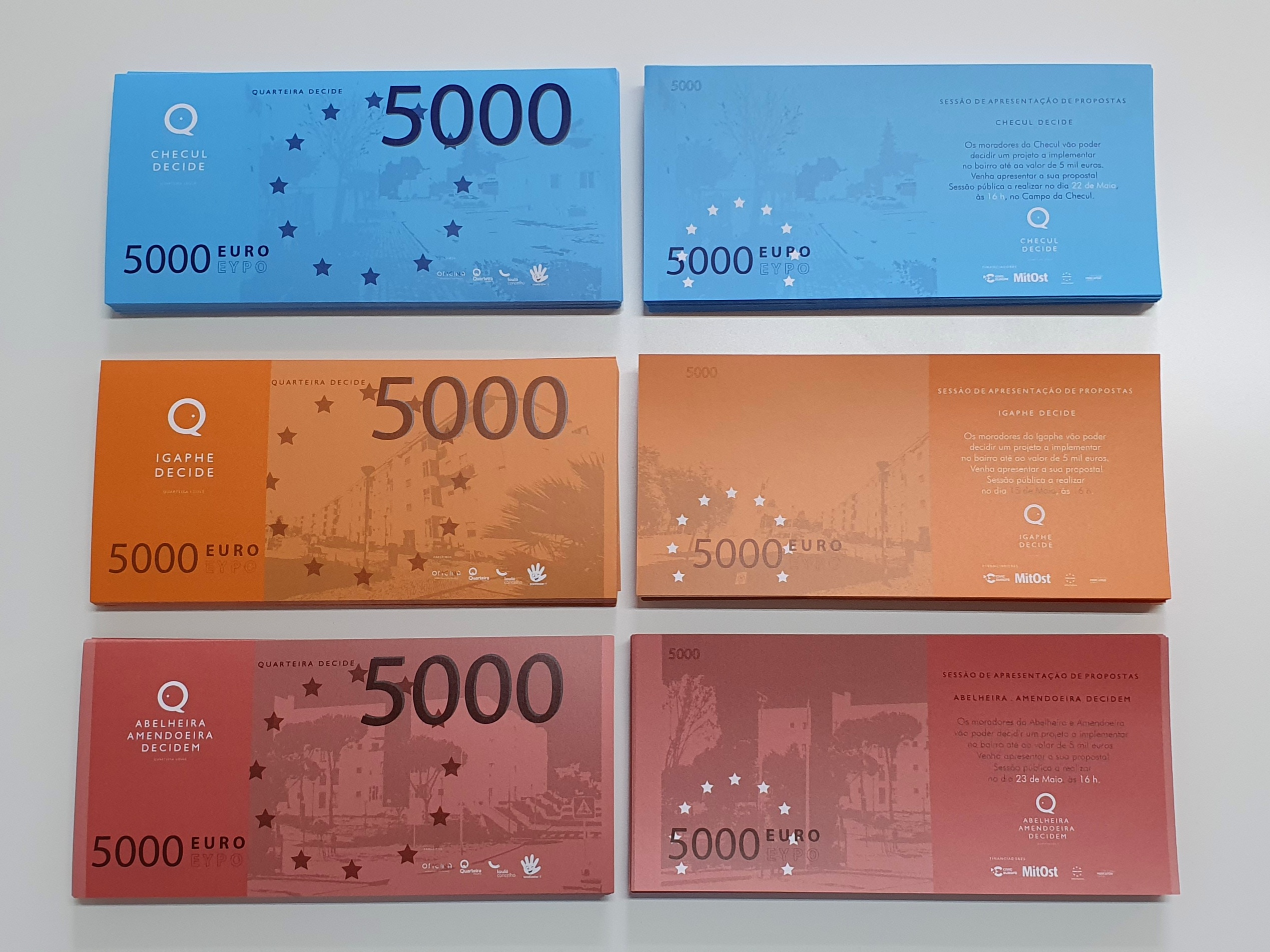
CHECUL NEIGHBOURHOOD WILL HAVE A PARTICIPATORY BUDGETING
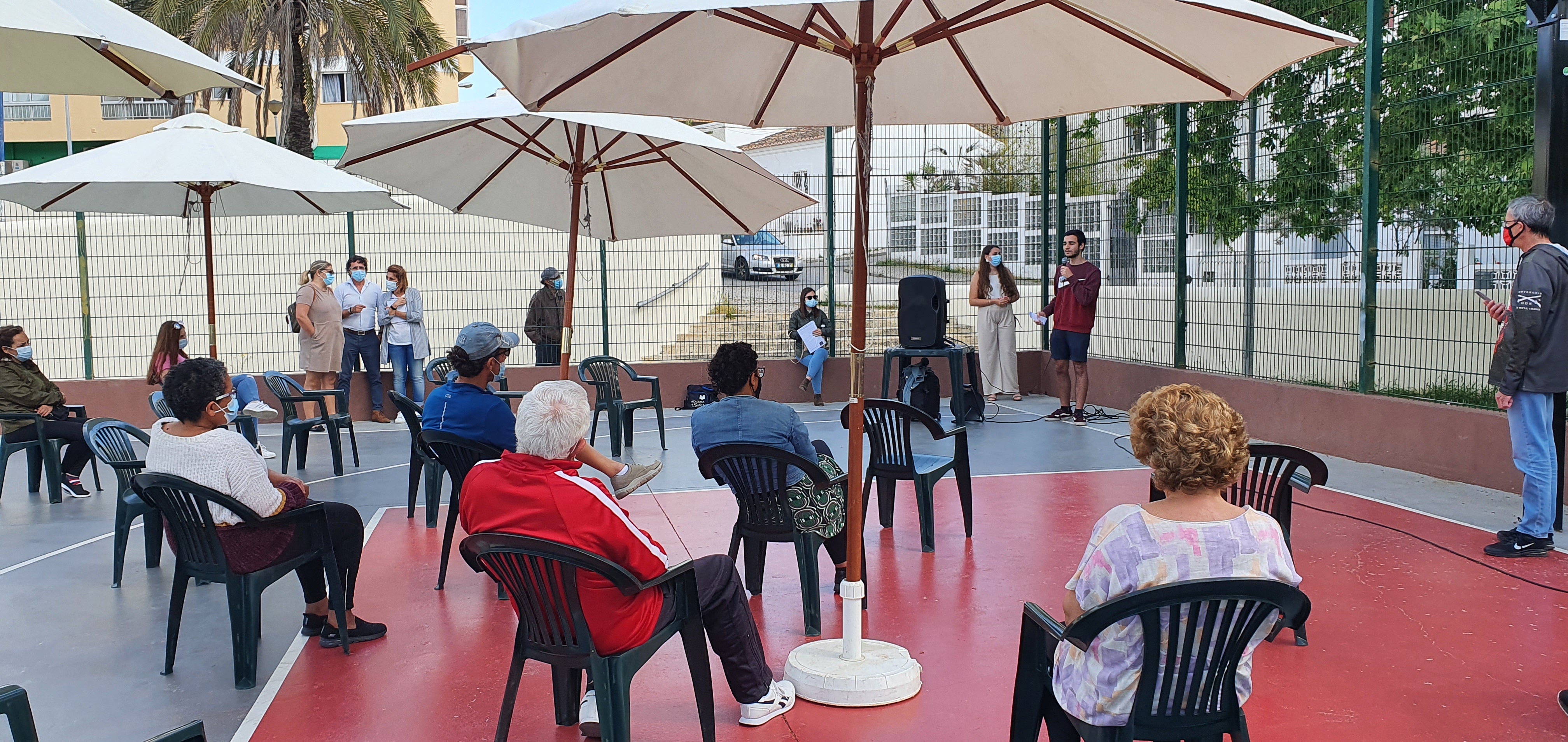 The Quarteira Decides Project promoted an information session in "Bairro da Checul", with the objective of making the Participatory Budgeting process known and clarifying the doubts of the participants.
The session was attended by Telmo Pinto, President of the Quarteira Parish Council, Nelson Dias, from the Oficina Association and coordinator of the project, as well as Giovanna Ramos and Vasco Viegas, residents of the neighbourhood and tutors of the Participatory Budget process. Vasco explained to the people present that the important thing is that the Checul neighbourhood can have this opportunity to speak, discuss their ideas and present their needs. In approximately one month, more precisely on May 22nd, another session will be held, in which it will be possible to present proposals, which will be analysed in order to assess whether they are feasible or not. Vasco concluded by saying that the winning project will be executed and that people from the neighbourhood will be involved in its execution.
The Quarteira Decides Project promoted an information session in "Bairro da Checul", with the objective of making the Participatory Budgeting process known and clarifying the doubts of the participants.
The session was attended by Telmo Pinto, President of the Quarteira Parish Council, Nelson Dias, from the Oficina Association and coordinator of the project, as well as Giovanna Ramos and Vasco Viegas, residents of the neighbourhood and tutors of the Participatory Budget process. Vasco explained to the people present that the important thing is that the Checul neighbourhood can have this opportunity to speak, discuss their ideas and present their needs. In approximately one month, more precisely on May 22nd, another session will be held, in which it will be possible to present proposals, which will be analysed in order to assess whether they are feasible or not. Vasco concluded by saying that the winning project will be executed and that people from the neighbourhood will be involved in its execution.
More info.
IGAPHE NEIGHBOURHOOD STARTED TO PARTICIPATE
Last Saturday, 17th April, the project QUARTEIRA DECIDE promoted an information session in the IGHAPE neighbourhood. Through a Participatory Budget methodology, the residents of this neighbourhood will be able to present, debate, decide and implement the project they consider most important and relevant for the community, up to the value of five thousand euros. The initiative was presented by Naína Andrade, tutor of the Participatory Budget and resident of the neighbourhood. She presented the objectives of the project and the different phases that are planned. Nelson Dias, the project coordinator, explained to the fifty or so people present that the team would return to the neighbourhood on 15 May to hold a new session, to be used for the presentation and discussion of proposals by the residents. These men and women thus have around four weeks to think about the projects they want, and to organise themselves in the best way possible. The Quarteira Decides Project also includes the Checul and Abelheira/Amendoeira neighbourhoods, also with a respective budget of five thousand euros.
+ info Notícias - OFICINA
Building the neighbourhood map
The Participatory Budgeting Tutors are young people recruited in the three project neighbourhoods and their role is to support the implementation of the whole process.
In one of the training sessions, these tutors were building the map of their neighbourhood. This is intended to help systematise the following information:
- physical map - which serves to point out existing problems in each neighbourhood, such as run-down places;
- symbolic map - used to locate places in the neighbourhood associated with specific uses by the residents, such as places where young people meet to take drugs.
This information is very useful for tutors to analyse their neighbourhoods and define, for example
- the best place to hold the public sessions of the Participatory Budgeting;
- the best communication and dissemination strategies for the process.
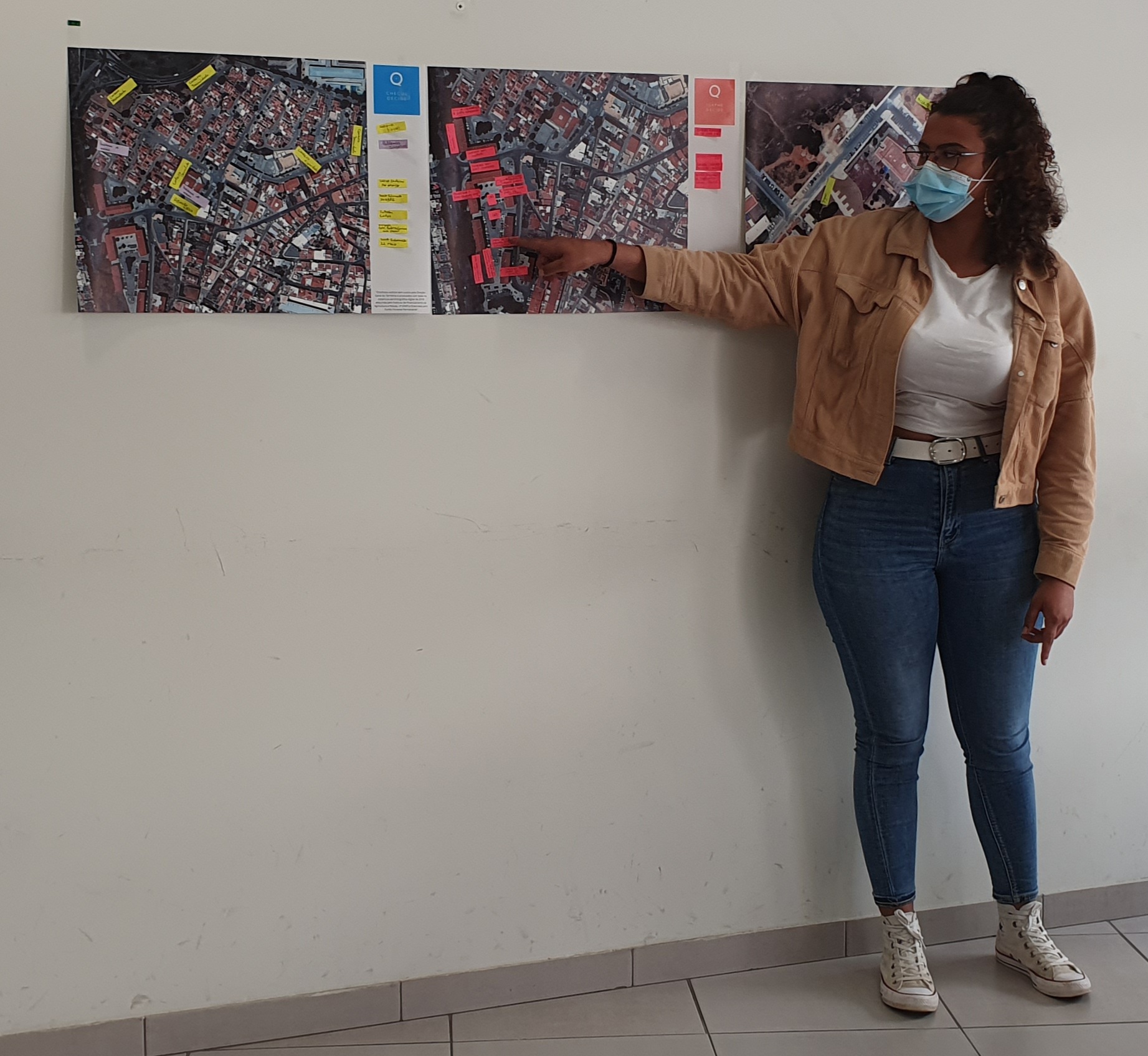

Tutors
Tutors of the Participatory Budgeting in each neighbourhood of the project
Tutors have been recruited in the neighbourhoods: IGAPHE, CHECUL and ABELHEIRA. Over the last few weeks we have been holding training sessions for these tutors. These sessions are taking place in person.
They have learned to understand the Participatory Budgeting and have been working on the construction of a map for each neighbourhood. On each map they have marked the physical problems and the symbolic problems of each neighbourhood.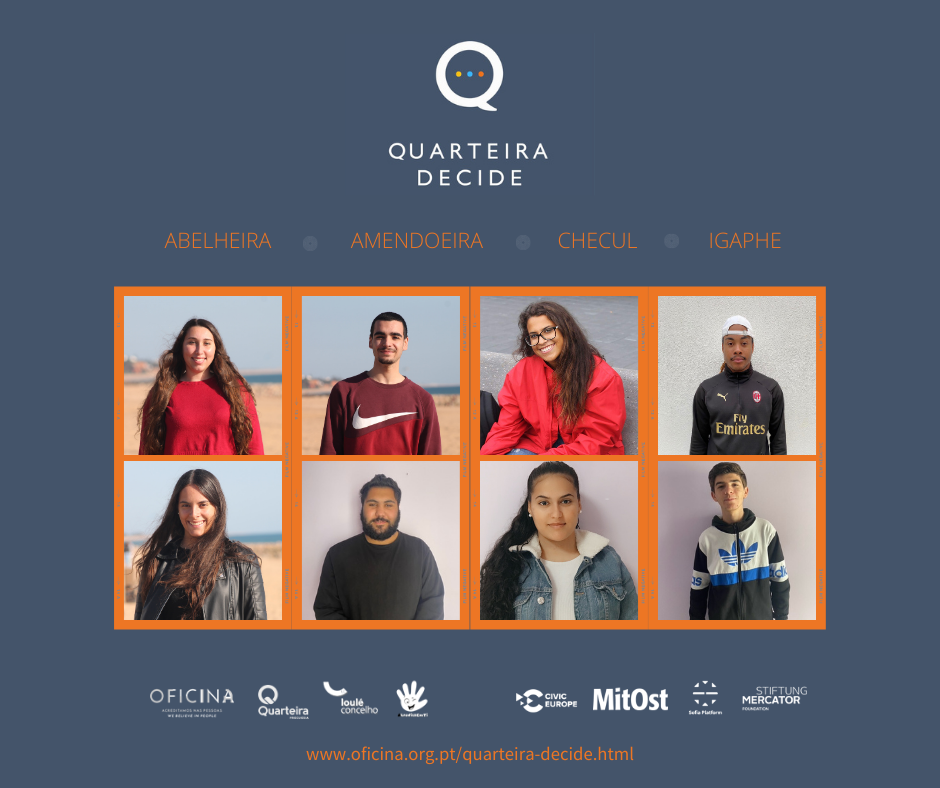
Write comment